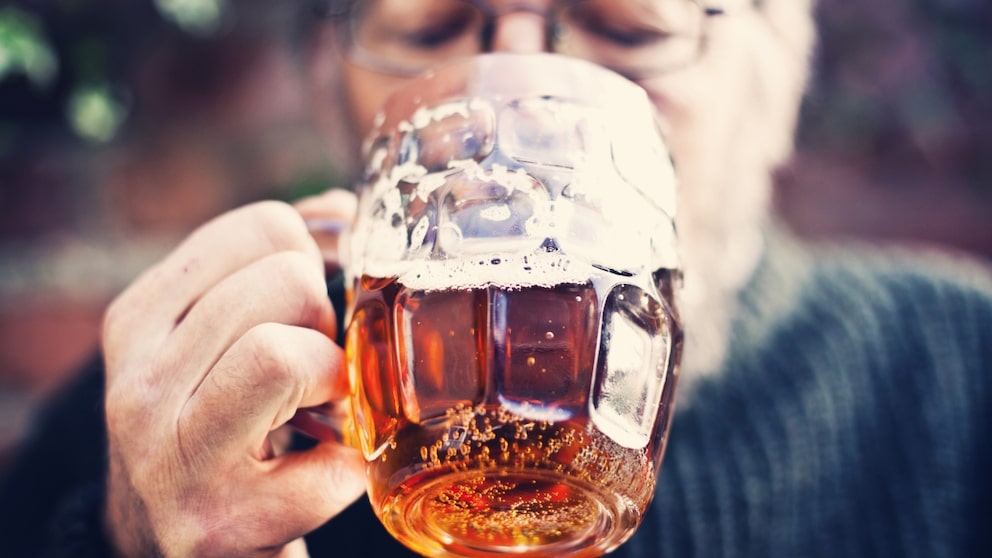January 5, 2025, 4:33 pm | Read time: 4 minutes
According to a study, even small amounts of alcohol – about one drink a day – can cause the brain to shrink. Scientists are sounding the alarm.
The proverbial glass seems to cause greater long-term damage than previously assumed. Even an amount of alcohol that is considered harmless, such as a small glass of wine or beer per day, damages the brain in the long term. This is the result of an analysis of data from more than 36,000 adults carried out by a team of researchers at the University of Pennsylvania. The study showed that the more pronounced the drinking behavior, the greater the permanent damage. Another study confirms previous findings.
Table of contents
How Alcohol Attacks the Brain and Causes It to Shrink
Volunteers answered questions about their alcohol consumption, ranging from complete abstinence to an average of four or more units of alcohol per day. MRI scans were also carried out. The researchers compared these scans with images of typical aging brains. They also took into account variables such as age, gender, smoking status, socioeconomic status, genetic ancestry, and overall head size.
On average, 50-year-olds who consumed one large beer or two glasses of wine (equivalent to two alcohol units) a day in the last month had brains that appeared two years older than those of people who drank only half a beer. This was particularly evident in the reduction of gray and white matter. These are the findings of a study by Remi Daviet’s research team at the University of Pennsylvania, which was published in the journal Nature Communications1. People who consumed three alcoholic drinks a day showed premature aging of the brain by 3.5 years.
However, It Becomes Dangerous After Two Drinks a Day
Switching from zero alcohol to one alcohol unit showed no significant difference in brain volume. In contrast, increasing from one to two or from two to three units per day was associated with a significant progressive reduction in both gray and white matter in the brain. “It’s not linear,” explains study leader Remi Daviet in a university press release.2 “It gets worse the more you drink.”
In plain language, while the transition from complete abstinence to a small glass of wine a day was “only” associated with half a year of aging, the difference between zero and four drinks a day corresponded to more than ten years of aging.
Giving Up One More Glass of Alcohol Could Save Your Brain from Premature Aging
Is it more harmful to drink one beer seven days a week or seven in one day? Daviet has a guess: “There is evidence that the effect of drinking on the brain is exponential. An additional drink in one day could, therefore, have a stronger effect than the previous ones. This means that abstaining from another tempting drink could have a significant impact on brain aging.”
Even if the mood party is so tempting, saying “no” to another glass of alcohol could prevent the brain from shrinking.

Alcohol Not Alone in the Blame Paradox! Researchers Find Surprising Reason for Red Wine Headaches

Study shows Even small amounts of alcohol can increase the risk of dementia

According to a Study Certain Sleep Routines Increase the Risk of Depression
Another Study Also Addresses the Risk
The study by Dr. Anya Topiwala and colleagues from the University of Oxford, published in PLOS Medicine, examines how even light to moderate alcohol consumption can affect the brain.3 The researchers found that as little as one to two alcoholic drinks per day is associated with a reduction in brain volume. These changes correspond to accelerated brain aging. The brain looks several years older than in people who do not consume alcohol. The results make it clear that even small amounts of alcohol can have long-term negative effects on brain structure and function.
The results of this study complement the research from the University of Pennsylvania. This also shows that alcohol consumption can reduce the volume of gray and white matter in the brain. While Daviet et al.’s research details how alcohol consumption affects specific regions of the brain, the Oxford study broadens the context by linking this damage to accelerated brain aging. Together, the two studies provide a more comprehensive picture of the negative effects of alcohol on brain health. They also underline that there is no such thing as a safe amount of alcohol.

